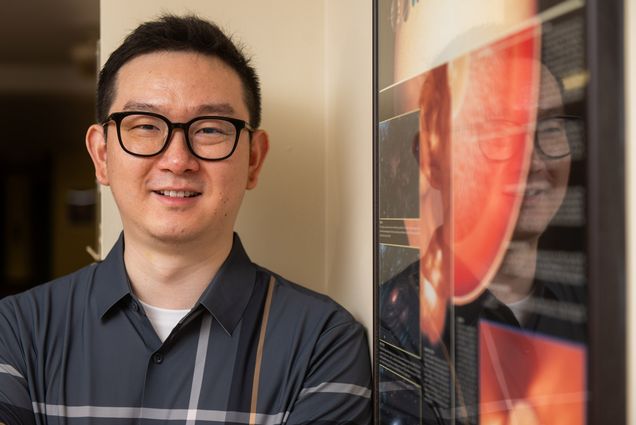Chuanfei Dong Receives 2023 HPC Innovation Excellence Award
By Margo Stanton, Hariri Institute for Computing
Hariri Institute Faculty Affiliate Chuanfei Dong received the 2023 HPC Innovation Excellence Award from Hyperion Research, which recognizes achievements made in High Performance Computing (HPC) technologies for business and scientific applications.
Dong, an assistant professor of astronomy and electrical and computer engineering at Boston University, was recognized for performing the world’s largest turbulence simulation using 200 million hours of computer time to unmask the flow of energy in space and astrophysical plasmas. This work is described in the Sciences Advances paper titled “Reconnection-Driven Energy Cascade in Magnetohydrodynamic Turbulence.”

In this project, Dong conducted simulations that identified a novel energy transfer mechanism that challenges the widely accepted classical paradigm of the turbulent energy cascade. This discovery, based on the breakup of elongated electric current sheets, facilitates the transfer of energy from large to small scales through the steepening of the energy spectra.
Dong’s work contributes to the tackling of a range of space and astrophysical puzzles, including one of the main goals of NASA’s Parker Solar Probe mission, solar coronal heating. Furthermore, it will help solve the questions behind star formation and predict eruptive space weather events that have the potential to disrupt cell phone service, black out the Earth’s power grids, and destroy satellites in orbit.
Some of Dong’s main research interests are in magnetic reconnection and turbulence, physics-informed machine learning, and high-intensity laser-plasma interactions. Dong was a recipient of the Department of Energy’s 2023 Early Career Research Award for his work on improving understanding of the flow of energy in plasma turbulence. This grant will help him expand on his research on “Reconnection-Driven Energy Cascade in Magnetohydrodynamic Turbulence.”
HPC Innovation Award recipients receive a $1,000 honorarium, award certificate, and trophy recognizing their achievements. The award recognizes developments made in simulation, artificial intelligence and other advanced analytics, quantum computing, and similar methods and technologies. It is internationally recognized as a touchstone for outstanding achievements in high-performance computing. Award winners range from government and academic research teams to global corporations.
Dong is involved in several significant research projects, ranging from NASA’s MAVEN mission, which studies how, billions of years ago, Mars lost a significant portion of its atmosphere, the joint European and Japanese BepiColombo mission on Mercury, and a study of the TRAPPIST-1 system, the newly discovered Earth-sized planets that orbit a star 39 light-years away from Earth, using James Webb Space Telescope.
Chuanfei Dong received his B.S. in Space Science from the University of Science and Technology in China, his M.S. in Earth and Atmospheric Sciences from Georgia Tech, an M.S. in Space Science, M.S.E. in Nuclear Engineering and Radiological Sciences, and dual Ph.D. in Space Science and Scientific Computing from the University of Michigan.